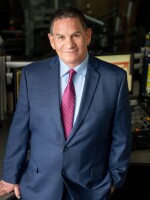We have been seeing record setting heat around the world. An award winning environmental journalist has written a new book looking at the connection between climate change, and extreme heat, and how it is affecting our lives.
"The risk of heat is a risk that everyone faces," said Jeff Goodell, who is the author of The Heat Will Kill You First: Life and Death on a Scorched Planet.
"It's not just outdoor workers, or older people who may have heart issues, or babies who are locked in cars. It's something that if we're in the wrong place, and we can't get out of the heat, it can kill anybody," said Goodell.
Goodell says the extreme heat we’re seeing is much more than an inconvenience. He says it’s impacting everything from our food supply to polar icecaps. He says in some cases it can be deadly.
He tells the story of a young couple who went on a hike in Northern California with their infant child, and dog. They all had heat stroke, and died.
The journalist said while many of us have the benefits of air conditioning, it’s really not the answer. It adds to global pollution, and billions of people in the world don’t have it.
Goodell says people ask him if it’s too late to stop what’s occurring. He says there are two answers: One is for what’s happening globally, and one for what’s happening in specific parts of the world.
He said a lot of people think about the question in a binary way. "Have we reached a tipping point? Are we doomed or not? The answer to that is very clearly no, we are not doomed, and no, it is not too late. Our future is still very much in our hands," said Goodell.
He said every ton of fossil fuel we keep from burning is a ton which will help keep our planet from burning up further.
But, he said we are hitting tipping points in some specific parts of the planet, where there are issues like ice sheets melting.
Goodell is hoping his book helps show people the extent of the crisis. He admits it’s a subject that’s hard to visualize.
"When a hurricane is coming, it's very clear. Roofs are flying off buildings. But, heat is invisible," said Goodell. "We don't have any kind of visual recognition of it."
He’s especially frustrated by the use of the phrase global warming instead of climate change.
"Global warming does not sound very urgent. It sounds like a better day at the beach. People generally like warmer weather. It's the reason why many people would rather live in Santa Barbara that Duluth," he said.
He’s written several books on environmental, and climate change issues. Does he think people are becoming more receptive to the situation?
"I've been writing about climate change for 20 years. When I first started writing about it, people who asked what I was writing about, and I told them, they looked at me as if I was writing about something like the sex lives of porcupines," said Goodell.
"Now, 15-20 years later, when people ask what I'm writing about, and I say climate change, they start peppering me with a million questions. Where shall I move? Is it too late? Climate change has become sort of the central conversation of our time," he said.
Goodell will speak at UC Santa Barbara October 17. It’s part of the UCSB Arts and Lectures Earth, Air, Fire, and Water series.



